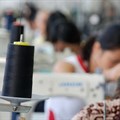Global e-retailer Shein, which has been widely criticised for unsustainable production methods, has announced targets to reduce overall emissions across its entire value chain by 25% by 2030 and its greenhouse gas (GHG) emissions inventory for 2021 - the year that will serve as the company's baseline for achieving its science-based targets.

Source: ©Vladimir Volovodov -
123RFThe fashion, beauty and lifestyle retail giant partnered with Intertek, a total quality assurance provider, to measure its 2021 carbon footprint impact, calculate its Scope 3 baseline emissions and identify science-based targets through jointly conducted interactive workshops. This collaboration resulted in establishing the following 2030 goals, which are being submitted via a commitment letter for validation by the Science Based Targets Initiative (SBTi).
Scope 1, emissions generated from Shein operations, accountable for less than 0.05% of 2021 overall emissions: Reduce absolute emissions by 42% by 2030
Scope 2, emissions from energy purchased to power Shein-owned facilities, accountable for less than 0.5% of 2021 overall emissions: Purchase renewable energy certificates (RECs) for 100% of electricity used in Shein operations by 2030
Scope 3, emissions generated from Shein's entire supply chain, accountable for more than 99% of 2021 overall emissions: Reduce absolute emissions by 25% by 2030
To reduce Scope 1 and 2 emissions, Shein will increase investments in energy-saving efforts across its operations, complemented by the purchase of renewable energy certificates (RECs). Given that Scope 3 generates the largest portion of Shein's emissions, the company said it will work closely with expert partners to collaborate on a transition to renewable energy sources and carbon reduction plans.
Decarbonisation and renewable energy transition
Shein also announced that it is committing up to $7.6m in programmatic funding to Apparel Impact Institute (Aii), a nonprofit organisation dedicated to decarbonising and modernising the fashion industry supply chain, to build the roadmap for emissions reduction within Shein's supply chain.
The contribution will go directly to two existing Aii programs: Carbon Leadership, focused on carbon benchmarking, assessment and goal-setting, and Clean by Design, which helps textile production facilities reduce energy, water and chemistry use, while also reducing cost. Aii will design a strategy focused on implementing energy efficiency projects at over 500 of Shein's partner facilities, generating an approximate 10% greenhouse gas emissions reduction per facility per year.
Shein has also begun working with Brookfield Renewable Partners to address GHG emissions in its supply chain through the transition to powering the operations of Shein's supply chain partners with renewable energy. Brookfield Renewable is one of the world's largest owners, operators and developers of renewable power, with approximately 23,000 megawatts of generating capacity and 75,000 MW of development pipeline that include wind, solar, energy storage, distributed generation, carbon capture and other energy transition asset classes.
"Today we're taking a significant step forward, announcing a new set of 2030 goals that will help us accomplish emissions reduction targets for our entire supply chain over the next seven years," said Adam Whinston, global head of ESG at Shein. "Our partnerships with Brookfield and Aii further demonstrate our commitment to implementing long-term initiatives to empower suppliers and work to promote sustainable innovation focusing on reducing carbon emissions. This announcement further solidifies our commitment to sustainability and corporate responsibility initiatives at a company level."
Shein's carbon reduction efforts in Scope 3 also will be combined with transformative plans in both product manufacturing to accelerate the incorporation of recycled materials and supply chain transformation, focusing heavily on nearshoring and onshoring, which the company said will dramatically reduce its reliance on airfreight.
Earlier this year, Shein ranked dismally on Fashion Revolution's Fashion Transparency Index, scoring just 2 out of 100. The index ranks 250 of the world’s largest fashion brands and retailers based on their public disclosure of human rights and environmental policies, practices, and impacts across their operations and supply chains.














